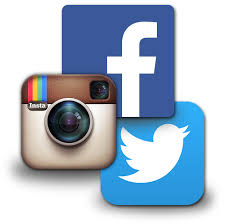Safety on Social Media

Social Media is an important part of our daily lives, but we can’t forget how dangerous it can sometimes be.
January 19, 2018
Almost all of us have at least one form of social media, and many of us spend the majority of our free time on our phones, scrolling endlessly through feeds. Social media websites are a great way to keep up with friends from around the country and around the world, learn more about the rest of the world, and know about events in the news. With every good thing, however, comes a significant amount of risk. The Internet’s reputation for trouble spreads quickly; almost everybody who uses social media websites has heard some kind of horror story about someone not being applicable for a job because of something shared online, or even abduction or personal information leaking. Here are some ways to make sure you stay safe online!
- Put your accounts on private
- It seems like a very simple idea, but one of the easiest ways to keep people from viewing your profile is to make sure they can’t. On platforms like Instagram and Facebook, there are some very simple ways to ensure that people can’t see your profile unless you have allowed them to follow you. Only your bio and profile picture is shown on Instagram, and you can choose what people can see on Facebook.
- Ask other people before posting a picture of them or before tagging them
- If you want to be safe online, remember that your friends probably want that as well. Make sure you’re courteous to people’s wishes and privacy. If you want to tag a friend, make sure you ask them about it first.
- Blocked and Reported
- There is no shame in blocking or unfollowing people if they are annoying you, or if you don’t want them to find you. People will sometimes make unfollowing and blocking seem like the ultimate insult, but if someone brings too much negativity into your life, it helps to not listen to what they are saying. Remember that your social media should be an extension of your life, and you should fill it with people who make you feel happy. To take it to another extent, if you are being harassed in some way, reporting people online isn’t a bad thing. If what they say hurts you, chances are that it hurts someone else as well, so watch out for yourself and for others as much as you can.
- Don’t share your location
- On platforms like Snapchat, it can be easy to show your location by having the ‘map’ feature on or by putting a geofilter on the picture. Unless you feel completely confident that no one who is able to see that will have any mil-intent, turn off features like this and don’t use geofilters. On Instagram, don’t add a location unless it’s so general that people couldn’t find you, especially if your location is somewhere very specific or popular. One of the most tempting things to do is to show off your new vacation location, but if someone can tell that you aren’t home, you put your house in danger. A simple solution to this problem: wait until you get back home to post those fun pictures.
- Only friend people you know
- Everyone likes to rack up their follower count, but having people looking at where you are or what you doing is potentially dangerous. Make sure you trust the people who follow you, and don’t talk to people online that you don’t know.
- Make sure your passwords are secure
- Hacking is one of the biggest threats on social media, since people who can get into your account can access as much information as they want. A good site on which to test your password is: https://howsecureismypassword.net/. If you need to make your password stronger, add a number to the end. Adding a single digit to the end of a password can more than double the time it would take for a computer to crack your password, making it much more secure.
The advent of the Internet makes connecting with other people instantaneous, but don’t forget that not everyone in the world has the same good intentions you do. Prioritizing your safety on the Internet is just as logical as wearing a seat belt or not waving a knife around, and these tips will make it a little easier to do.

